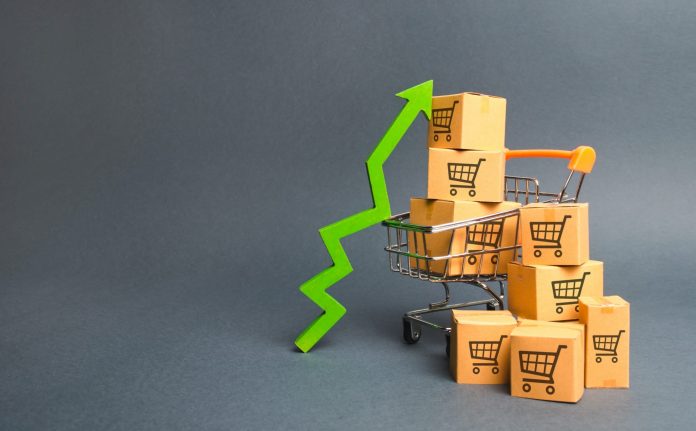The Australian Bureau of Statistics (ABS) has confirmed $30.7 billion was spent in stores and online in March – a 2.2% increase on the same time last year.
Australian Retailers Association CEO Paul Zahra said while year on year sales growth is still positive, it’s significantly lower than previous months, driven by a decline in supermarkets which are cycling the panic buying period from last year.
“Year on year retail sales growth averaged more than 10% between November 2020 and February 2021, but that’s come down significantly in March, mainly due to the elevated levels of spending we saw last year in supermarkets at the start of the pandemic,” Mr Zahra said.
“Whilst food retailing was down $2.1 billion – or 15% – through the year to March, the other categories of retail have performed exceptionally well.
“Household goods were up $518 million or 10%, clothing, footwear and personal accessories were up $880 million or 54%, department stores were up $368 million or 25% and cafes, restaurants and takeaway food services were up $1 billion or 33%.
“Australians continue to embrace online shopping with sales up 37.4% in March compared to the same time last year.
“There’s no doubt the retail sector is helping to drive Australia’s economic recovery, but more needs to be done to remove the impediments to productivity and growth.
“The skills shortage is a major issue for a lot of retailers, and with the Federal Government flagging that international borders will remain closed until 2022 – the lack of skilled migrants will remain an ongoing concern for businesses struggling to fill the gap in their workforces.
“The Federal Government has a key role to play in providing training, upskilling programs and incentives to support new and existing workers. There have been numerous announcements about training programs and apprenticeships in recent times, but these are usually geared towards the traditional trades, overlooking retail workers. That’s overlooking retail – Australia’s largest private sector employer, where one in 10 Australians work. The sector will play an enormous part in our national recovery.
“There needs to be a retail focus in any future training or upskilling programs and we urge the Federal Government to make that clear in tomorrow night’s Budget.”
All eyes turn to the Budget
As retailers across the country eagerly anticipate tomorrow night’s Federal Budget, sales across Australia rose by 1.3% in the month of March according to the ABS.
Retail sales volumes for the March 2021 quarter fell by 0.5% as shoppers cut back on discretionary purchases and return to pre-pandemic spending patterns.
National Retail Association CEO Dominique Lamb said the March figures demonstrate that it is still a volatile time for retailers.
“The 12 months to March 2021 has undoubtedly been the most turbulent period retail has experienced in living memory,” Ms Lamb said.
“Panic-buying, lockdowns, supply chain disruptions and myriad other challenges has at times seen retail sales go wildly from one extreme to the other. But we’re now starting to see shoppers slowly return to their pre-pandemic shopping habits.
“Lockdowns continue to have a material effect on retail sales. Both Victoria and Western Australia surged in March following February lockdowns in both states, while the three-day Brisbane lockdown plunged Queensland into negative turnover for the month.”
Ahead of tomorrow night’s Federal Budget, Ms Lamb said retailers would like to see measures that maintain healthy levels of discretionary spending.
“Discretionary spending reached unprecedented levels at the end of 2020. An inability to travel overseas, coupled with stimulus measures, saw shoppers stampede retail outlets during the traditionally busy Christmas period,” Ms Lamb said.
“While it was always expected that spending levels would begin to taper off, we need to ensure consumer spending does not fall off a cliff and we hope to see measures in the Budget that address this.
“Extending the tax offset for low and middle income earners for a further 12 months will help to encourage consumer spending. While we also hope to see initiatives that help small business and encourage economic activity.
“Maintaining a strong level of demand will be crucial to ensuring a quick economic recovery and help to safeguard jobs in Australia’s second-largest workforce.”


